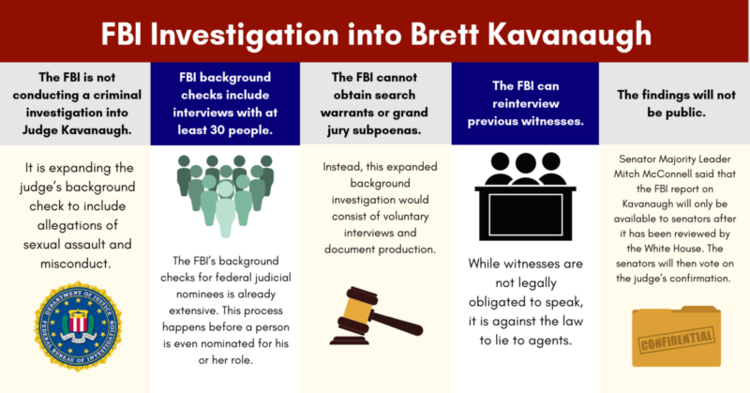Five Facts on FBI Investigations

This week, the FBI is concluding a supplementary investigation into Supreme Court nominee Brett Kavanaugh’s past, following testimony from Dr. Christine Blasey Ford accusing the judge of past sexual misconduct. While the public does not know exactly what the FBI is investigating, news outlets report that witnesses who went to high school with Judge Kavanaugh have not yet been questioned. The FBI probe has enormous implications: CNN has reported that Democrats have demanded to know the directive given to the FBI by the White House before agreeing to a vote.
While the Kavanaugh probe differs from other FBI investigations in its high-profile nature and short time frame, the agency is responsible for conducting thousands of investigations a year. Here are five facts on the investigation into Judge Kavanaugh and general FBI procedure:
1. According to Vox, the FBI is not conducting a criminal investigation into Judge Kavanaugh. Rather, it is expanding the judge’s background check to include sexual assault and misconduct. Vox reports that the FBI will likely investigate the sexual assault allegations against Judge Kavanaugh from Dr. Ford and two other women, Deborah Ramirez and Julie Swetnick. Ultimately, the White House decides the scope of the investigation. It has already limited the timeline of the investigation to one week.

2. The FBI’s background checks for federal judicial nominees is already extensive. This process happens before a person is even nominated for his or her role. According to The New York Times, FBI agents speak with at least 30 people during a background investigation of this nature. This includes judges, lawyers, and law enforcement officials, all of whom can recommend that FBI agents speak with further witnesses. In addition, roommates, neighbors, and family members may also be subject to interviews.
3. The New York Times reports that this expanded background investigation would consist of voluntary interviews and document production. The Times notes that, since this is not a criminal investigation, the FBI will not be able to obtain search warrants or grand jury subpoenas as it does in criminal investigations. Search warrants allow the FBI to look into a particular area for evidence, and grand jury subpoenas obtain evidence from people who can help with the investigation.
4. It is also possible that agents would speak with previous witnesses for a second time, the BBC reports. While witnesses are not legally obligated to speak, it is against the law to lie to agents.
5. According to CNN Politics, Senate Majority Leader Mitch McConnell has said the FBI’s findings will not be released to the public. Instead, Sen. McConnell stressed, the report will only be available to senators after it has been reviewed by the White House. The senators will then vote on the judge’s confirmation.
No Labels is an organization of Democrats, Republicans, and independents working to bring American leaders together to solve problems.




